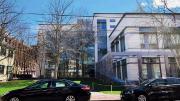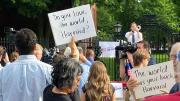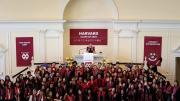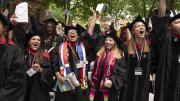Quantum Quest
As befits its subject, the Ph.D. program in quantum science and engineering approved by the Faculty of Arts and Sciences on April 6 is a small part of a much larger universe of Harvard commitment to a burgeoning new field: the rare, large academic initiative garnering significant support even as the University hunkered down to cope with the pandemic. In late April, following Corporation approval, Harvard announced plans to renovate 60 Oxford Street into a specialized hub for research in quantum science and engineering. Significantly, at a time when faculty hiring is severely constrained, several searches for new faculty members in this field are already under way, in hopes of recruiting as many as 10 during the next decade to join an already active group of researchers and educators. Together, the facilities and prospective faculty appointments suggest a significant academic investment.
The work envisioned encompasses fundamental discoveries in electrical engineering, computer science, biology, and chemistry, with applications ranging from the design of semiconductors to new processes for identifying molecules in living subjects (basic to research in many life sciences). The doctoral curriculum will draw on existing courses in quantum science—which encompasses physics at the scale of atoms and subatomic particles, or that is linked to the discrete energy states (quanta) associated with these objects—as well as courses in materials and computer science, photonics, chemistry, and related fields.
Beyond the promise of discoveries in quantum science and engineering (read a comprehensive report on Harvard’s scientists, their work, and the new program at harvardmag.com/quantum-phd-21), the new program suggests what it now takes to muster equivalent academic initiatives elsewhere at the University. First, a nucleus of faculty leaders interested in the field—in this case, catalyzed by a Harvard Quantum Initiative organized in 2018. Second, a field that builds on existing University intellectual capital, justifies new resources, and can attract significant philanthropic support (given the building renovations and instrumentation required, and the faculty growth envisioned, in this case; the University cited “generous support from Stacey L. and David E. Goel ’93 and several other alumni”). Finally, for good measure, the potential for substantial external sponsored-research funding. The federal government is committing billions to academic research in quantum science, and most major cloud-computing enterprises, and other private businesses, are pursuing opportunities, too: Amazon Web Services, for example, has underwritten a broad collaboration, dubbed the AWS Center for Quantum Computing, with Caltech.
Given Harvard’s new commitments, its proximity to and existing collaborations with MIT, and the example of Boston’s robust academic and corporate life-sciences ecosystem, the University’s heightened interest in subatomic, quantum-scale science must look to its leaders and supporters like the start of something big.
—Jonathan Shaw and John S. Rosenberg
Divestment Updates
Advocacy for divesting endowment investments in enterprises that develop and market fossil fuels continues. Following the University’s February release of its first report on measures to achieve a net-zero (no net release of carbon) investment portfolio by 2050 (see harvardmag.com/hmc-fossilfuel-net0update-21), faculty diverstment advocates characterized it as “vague” and “general” in a letter to members of the Corporation. “Decarbonization can and should be achieved well before 2050,” they wrote, and “Divestment…is integral to the goal of decarbonization.” Separately, Fossil Fuel Divest Harvard, the student advocates, filed a complaint with the Massachusetts attorney general alleging that remaining fossil-fuel assets are a violation of the law governing prudent investment of charitable funds. Faculty advocates subsequently endorsed the suit, a strong suggestion that efforts at dialogue within the community and the net-zero policy haven’t resolved differences over the issue amid common concerns about climate change.
In April, Yale promulgated a new set of investment principles guiding its decisions concerning fossil-fuel producers. Violations of the resulting standards for companies’ conduct would warrant divestment from Yale’s endowment. According to the committee that crafted the principles, “[T]o remain eligible for investment by Yale, a…company must avoid the exploration and production of fossil fuels that result in high levels of [greenhouse-gas] emissions relative to energy supplied, as compared to feasible alternatives. This idea extends…also to the specific methods of extraction and whether there are feasible alternatives to such methods.” Further, “We believe that fossil-fuel companies should support and not undermine meaningful and effective government policy to combat climate change, refrain from supporting climate change denial, and provide accurate information about climate science and climate change.” Initial divestment recommendations were expected to be made in June.
Advancing a somewhat broader perspective on the issue, L. Rafael Reif, president of MIT, described climate change as an “Earthshot” problem—even beyond a “moonshot” in complexity and difficulty—in an Earth Day op-ed in The Boston Globe. “The problem requires sustained contributions from every corner of industry, every level of government, every academic institution, every foundation and philanthropist, and from all of us as individuals,” he wrote. “We must find affordable, equitable ways to bring every aspect of the global economy to net-zero carbon no later than 2050. At the same time, we must adapt to effects of climate change we can’t prevent.” Hence, a role for the Engineers, and other Boston-area universities: “[W]e need to invest in, invent, and deploy a suite of new tools, including science and technology breakthroughs, that it will take to fully reach the 2050 goal.”
—J.S.R.
Admissions Litigation
Following district and appeals court decisions against its claim that Harvard College unfairly discriminates against Asian American applicants—part of a larger effort to eliminate any consideration of race as a factor in holistic admissions practices—Students for Fair Admissions last February asked the Supreme Court to review its case (see harvardmag.com/sffa-supremecourt-appeal-21). In mid May, Harvard filed its brief in opposition to SFFA’s petition to the Court, noting that “the district court concluded that Harvard College’s admissions program comports with this Court’s precedents governing consideration of race in university admissions and does not discriminate against Asian-American applicants. The First Circuit upheld those findings and conclusions as firmly grounded in the trial record and precedent.”
In seeking further review, Harvard continued, SFFA “recycles allegations both courts rejected and offers a thoroughly distorted presentation of the record.” Given that the prior courts did not disagree, and that the case would have the Court “review the application of settled law to a particular set of facts,” Harvard argued that there is little precedent for the Court to hear the matter anew. The brief maintained that SFFA falls “far short” of providing sufficient reason for the justices to repudiate their own precedent established through “more than 40 years of decisions regarding the limited consideration of race in university admissions”—with which Harvard has complied.
The Court’s decision on whether to take up the case is expected in early June, after this issue has gone to press. Updated June 14, 2021: The Court deferred its decision by asking the acting solicitor general to “file a brief in this case expressing the views of the United States.” Those views are likely to support the University’s position and to oppose SFFA’s; the Biden administration reversed the Trump administration in February, dropping support for a similar suit against Yale’s admissions policies. The administration brief is likely to become available during the fall, when the Court would again consider whether to hear the Harvard case (or perhaps wait until SFFA’s litigation against the University of North Carolina, a public institution, reaches it).
—J.S.R.









